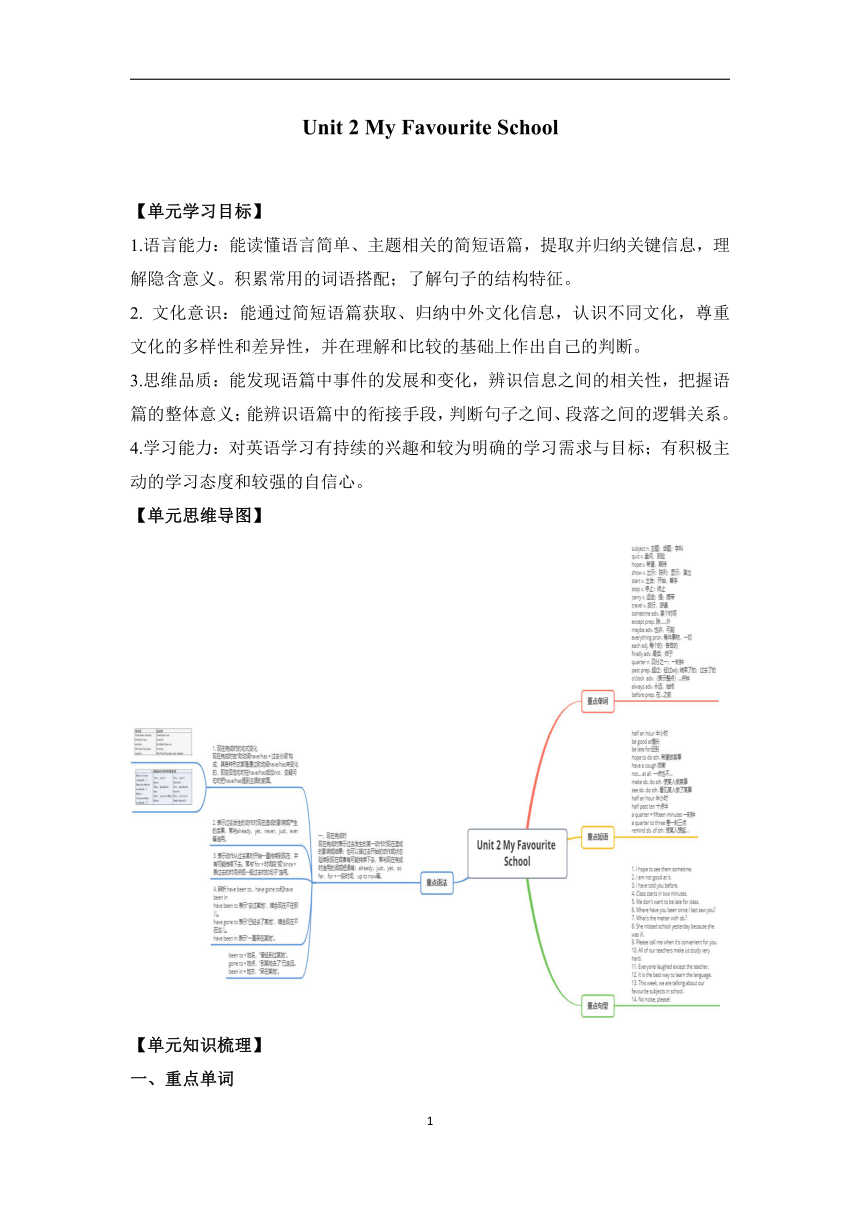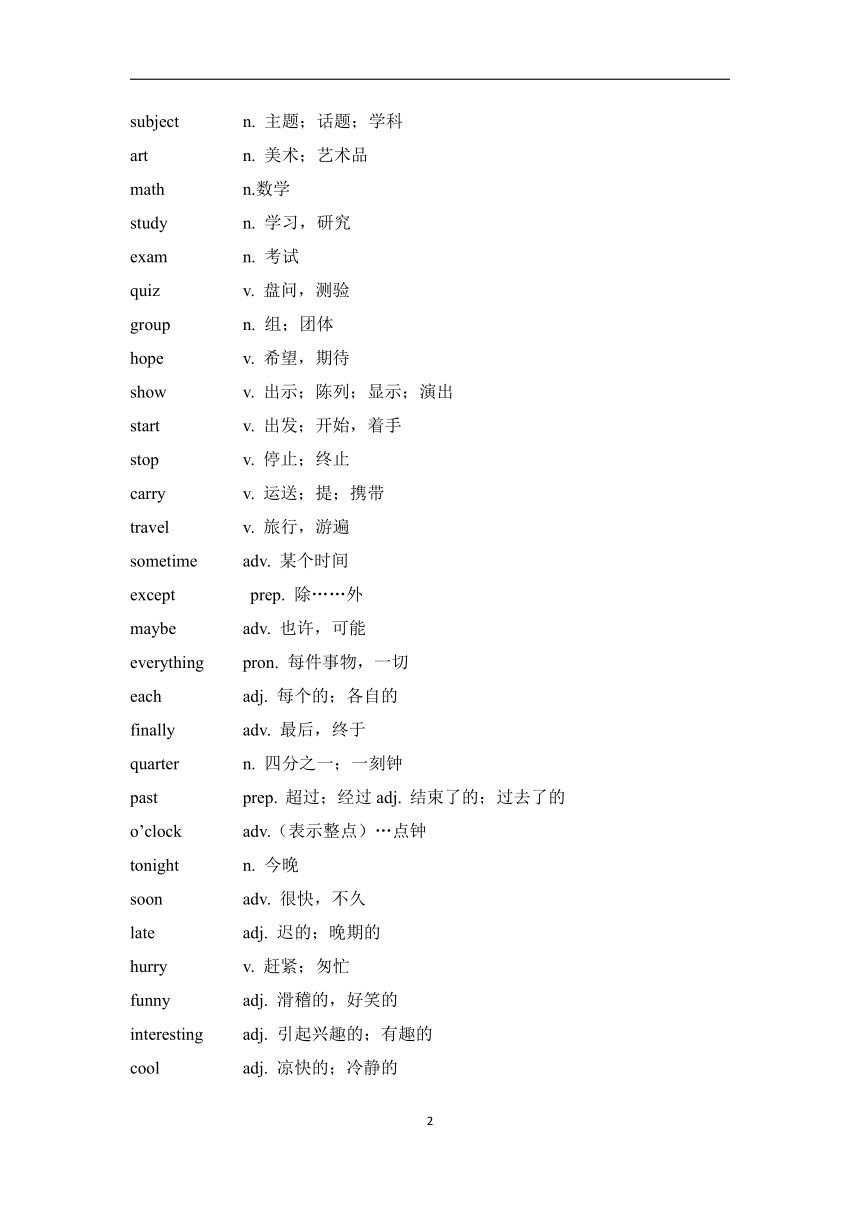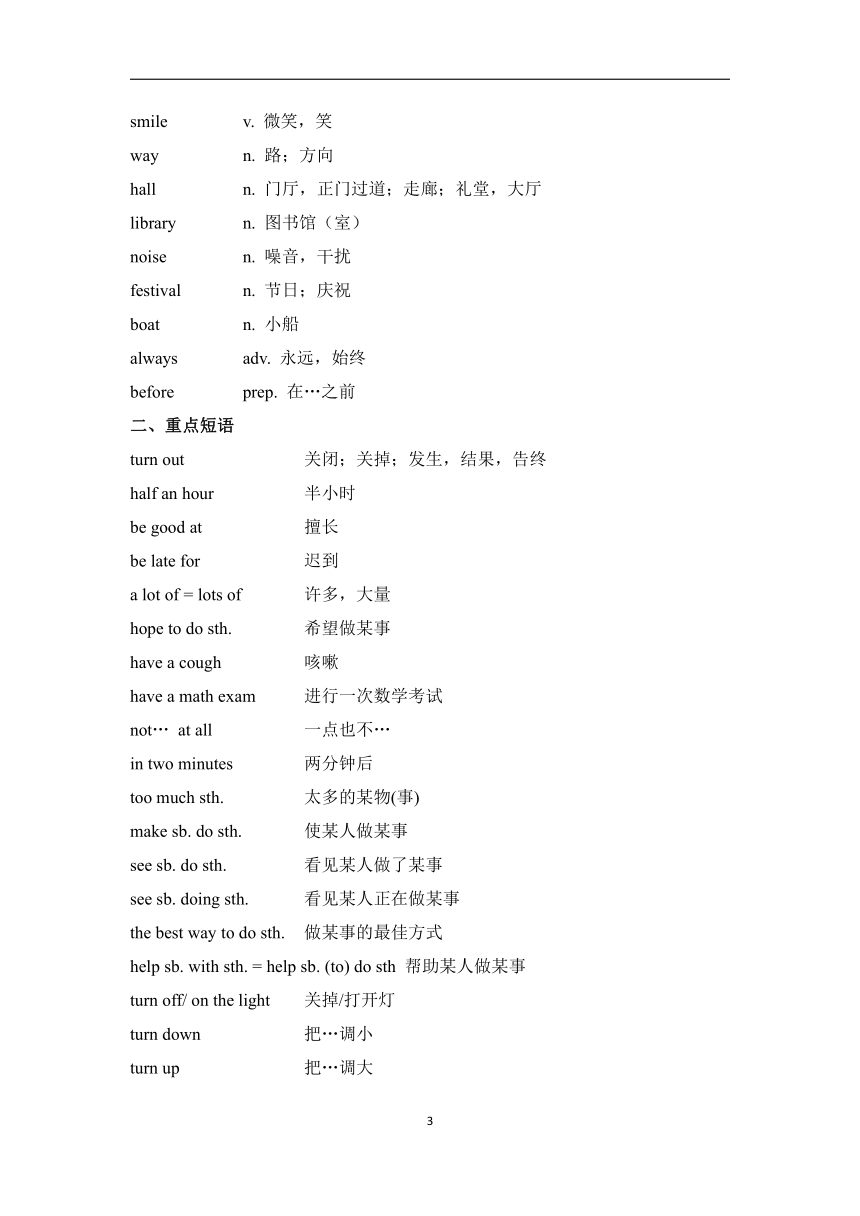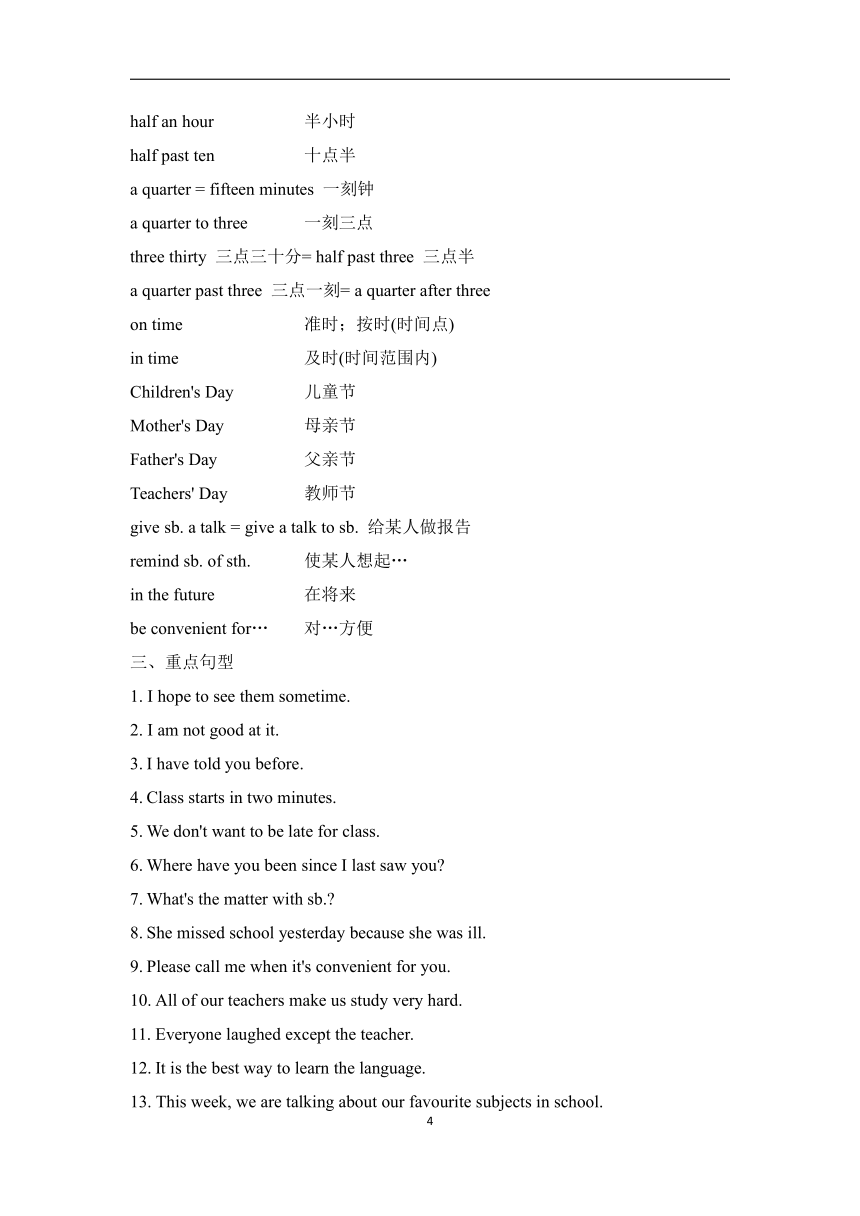Unit 2 My Favourite School单元知识清单学案(含解析)
文档属性
| 名称 | Unit 2 My Favourite School单元知识清单学案(含解析) |

|
|
| 格式 | docx | ||
| 文件大小 | 261.6KB | ||
| 资源类型 | 教案 | ||
| 版本资源 | 冀教版 | ||
| 科目 | 英语 | ||
| 更新时间 | 2023-10-28 14:44:10 | ||
图片预览




文档简介
Unit 2 My Favourite School
【单元学习目标】
1.语言能力:能读懂语言简单、主题相关的简短语篇,提取并归纳关键信息,理解隐含意义。积累常用的词语搭配;了解句子的结构特征。
2. 文化意识:能通过简短语篇获取、归纳中外文化信息,认识不同文化,尊重文化的多样性和差异性,并在理解和比较的基础上作出自己的判断。
3.思维品质:能发现语篇中事件的发展和变化,辨识信息之间的相关性,把握语篇的整体意义;能辨识语篇中的衔接手段,判断句子之间、段落之间的逻辑关系。
4.学习能力:对英语学习有持续的兴趣和较为明确的学习需求与目标;有积极主动的学习态度和较强的自信心。
【单元思维导图】
【单元知识梳理】
一、重点单词
subject n. 主题;话题;学科
art n. 美术;艺术品
math n.数学
study n. 学习,研究
exam n. 考试
quiz v. 盘问,测验
group n. 组;团体
hope v. 希望,期待
show v. 出示;陈列;显示;演出
start v. 出发;开始,着手
stop v. 停止;终止
carry v. 运送;提;携带
travel v. 旅行,游遍
sometime adv. 某个时间
except prep. 除……外
maybe adv. 也许,可能
everything pron. 每件事物,一切
each adj. 每个的;各自的
finally adv. 最后,终于
quarter n. 四分之一;一刻钟
past prep. 超过;经过adj. 结束了的;过去了的
o’clock adv.(表示整点)…点钟
tonight n. 今晚
soon adv. 很快,不久
late adj. 迟的;晚期的
hurry v. 赶紧;匆忙
funny adj. 滑稽的,好笑的
interesting adj. 引起兴趣的;有趣的
cool adj. 凉快的;冷静的
smile v. 微笑,笑
way n. 路;方向
hall n. 门厅,正门过道;走廊;礼堂,大厅
library n. 图书馆(室)
noise n. 噪音,干扰
festival n. 节日;庆祝
boat n. 小船
always adv. 永远,始终
before prep. 在…之前
二、重点短语
turn out 关闭;关掉;发生,结果,告终
half an hour 半小时
be good at 擅长
be late for 迟到
a lot of = lots of 许多,大量
hope to do sth. 希望做某事
have a cough 咳嗽
have a math exam 进行一次数学考试
not… at all 一点也不…
in two minutes 两分钟后
too much sth. 太多的某物(事)
make sb. do sth. 使某人做某事
see sb. do sth. 看见某人做了某事
see sb. doing sth. 看见某人正在做某事
the best way to do sth. 做某事的最佳方式
help sb. with sth. = help sb. (to) do sth 帮助某人做某事
turn off/ on the light 关掉/打开灯
turn down 把…调小
turn up 把…调大
half an hour 半小时
half past ten 十点半
a quarter = fifteen minutes 一刻钟
a quarter to three 一刻三点
three thirty 三点三十分= half past three 三点半
a quarter past three 三点一刻= a quarter after three
on time 准时;按时(时间点)
in time 及时(时间范围内)
Children's Day 儿童节
Mother's Day 母亲节
Father's Day 父亲节
Teachers' Day 教师节
give sb. a talk = give a talk to sb. 给某人做报告
remind sb. of sth. 使某人想起…
in the future 在将来
be convenient for… 对…方便
三、重点句型
1. I hope to see them sometime.
2. I am not good at it.
3. I have told you before.
4. Class starts in two minutes.
5. We don't want to be late for class.
6. Where have you been since I last saw you
7. What's the matter with sb.
8. She missed school yesterday because she was ill.
9. Please call me when it's convenient for you.
10. All of our teachers make us study very hard.
11. Everyone laughed except the teacher.
12. It is the best way to learn the language.
13. This week, we are talking about our favourite subjects in school.
14. No noise, please!
15. Lisa and I are going to work on our basketball project together.
16. I told her to meet me at a quarter to three.
17. It's a quarter after three.
18. We have Mother’s Day and Father’s Day here but no Children’s Day.
19. We each brought a painting to class.
20. The picture always reminds me of that holiday.
21. We had a good discussion about how to stay healthy.
【单元易混易错】
一、现在完成时
现在完成时表示过去发生的某一动作对现在造成的影响或结果;也可以指过去开始的动作或状态延续到现在或者有可能持续下去,常与现在完成时连用的词或短语有:already,just,yet,so far,for+一段时间,up to now等。
1. 现在完成时的句式变化
现在完成时由“助动词have/has+过去分词”构成,其各种形式都是通过助动词have/has来变化的,即变否定句时在have/has后加not,变疑问句时把have/has提到主语的前面。
—When will you hand in your book report
你什么时候交读书报告?
—Sorry, I'm not sure. I haven't finished writing it yet.
不好意思,我不确定。我至今还没写完。
2. 表示过去发生的动作对现在造成的影响或产生的后果,常与already,yet,never,just,ever等连用。
She has already finished the work.
她已经完成了这份工作。
I have just heard the news.
我刚刚听到这则消息。
He has never/ever visited the Great Wall.
他从来没有/曾经游览过长城。
I haven't finished my homework yet.
我还没做完家庭作业。
3. 表示动作从过去某时开始一直持续到现在,并有可能持续下去。常与“for+时间段”或“since+表过去的时间点或一般过去时的句子”连用。
The young man has lived alone since he graduated from college.
这个年轻人大学毕业后就开始独自居住了。
表示瞬间动作的词在现在完成时的肯定句中不能与表达一段时间的时间状语连用。当这些词与一段时间连用时,可进行以下变化:
Leave → be away;begin,start → be on;
join → be in;die → be dead;
buy → have;borrow,lend → keep
The game has been on for five minutes.
比赛已经开始五分钟了。
4. 辨析 have been to,have gone to和have been in
have been to 表示“去过某地”,暗含现在不在那儿。
have gone to 表示“已经去了某地”,暗含现在不在这儿。
have been in 表示“一直呆在某地”。
He isn't here right now. He has gone to London.
他现在没在这里。他去伦敦了。
How long have you been in China
你在中国呆了多久?
been to+地名,“曾经到过某地”。
gone to+地点,“到某地去了”已走远。
been in+地方,“呆在某地”。
【单元对接中考】
1.【2021年河北】Please be polite and ________ offer your seat to people who need it.
A. never B. seldom C. sometimes D. always
2.【2021年河北】William _____ six books, and all of them are bestsellers.
A. will write B. is writing C. has written D. was writing
3.【2021年江西】—How do we turn on the oven
—I _______ you. Weren't you listening
A. tell B. am telling C. will tell D. have told
4.【2023年福建】—Sally, I ________ the picture already.
—Wow, truly beautiful!
A. finish B. have finished C. was finishing
5.【2023年天津】You should turn off the lights ________ you leave the room.
A. until B. before C. although D. so
6.【2023年安徽】Computers have had a great influence on learning methods since they ______ into schools.
A. introduce B. introduced C. are introduced D. were introduced
7.【2023年河北】This book must be great. My sister ___________ it five times.
A. reads B. has read C. is reading D. was reading
8.【2021年重庆】We hope ______ a beautiful home by living a low-carbon life (低碳生活).
A. build B. building C. to build
答案以及解析
1. 答案:D
解析:本题考查副词的词义辨析。never从不; seldom很少; sometimes有时; always总是, 一直。根据设空前的"要有礼貌"可知此处是说, 要始终把座位让给有需要的人。故always符合题意。
2. 答案:C
解析:句意为: 威廉写了六本书, 它们都是畅销书。根据语境可知书已经写完了, 此处应用现在完成时。
3. 答案:D
解析:本题考查动词时态。根据答语中的"Weren't you listening"可知此处是说, 我已经告诉过你了, "告诉"这个动作已经完成, 故选D。
4. 答案:B
解析:本题考查动词的时态。根据语境及题干中的"already"可知,此处应用现在完成时,其结构为"have/has+过去分词",故选B。
5. 答案:B
解析:本题考查连词。设空前表示"你应该关灯";设空后表示"你离开房间"。根据设空前后的内容及常识可知,before"在……以前"符合题意。
6. 答案:D
解析:本题考查时态和语态。since(自从)引导时间状语从句,主句中用了现在完成时,从句应用一般过去时;又因为从句的主语they 指代前面的Computers,其和谓语动词introduce之间存在逻辑上的被动关系,应用被动语态。故选D。
7. 答案:B
解析:本题考查现在完成时。根据前句"This book must be great"可知,此处说明这本书对姐姐的影响—她已经读了五遍了,故用现在完成时。
8. 答案:C
解析:build建设。选项A是动词原形;选项B是动名词;选项C是动词不定式。句中的hope的意思是希望,后面接动词不定式作宾语,本题答案是C。故选:C。
2
【单元学习目标】
1.语言能力:能读懂语言简单、主题相关的简短语篇,提取并归纳关键信息,理解隐含意义。积累常用的词语搭配;了解句子的结构特征。
2. 文化意识:能通过简短语篇获取、归纳中外文化信息,认识不同文化,尊重文化的多样性和差异性,并在理解和比较的基础上作出自己的判断。
3.思维品质:能发现语篇中事件的发展和变化,辨识信息之间的相关性,把握语篇的整体意义;能辨识语篇中的衔接手段,判断句子之间、段落之间的逻辑关系。
4.学习能力:对英语学习有持续的兴趣和较为明确的学习需求与目标;有积极主动的学习态度和较强的自信心。
【单元思维导图】
【单元知识梳理】
一、重点单词
subject n. 主题;话题;学科
art n. 美术;艺术品
math n.数学
study n. 学习,研究
exam n. 考试
quiz v. 盘问,测验
group n. 组;团体
hope v. 希望,期待
show v. 出示;陈列;显示;演出
start v. 出发;开始,着手
stop v. 停止;终止
carry v. 运送;提;携带
travel v. 旅行,游遍
sometime adv. 某个时间
except prep. 除……外
maybe adv. 也许,可能
everything pron. 每件事物,一切
each adj. 每个的;各自的
finally adv. 最后,终于
quarter n. 四分之一;一刻钟
past prep. 超过;经过adj. 结束了的;过去了的
o’clock adv.(表示整点)…点钟
tonight n. 今晚
soon adv. 很快,不久
late adj. 迟的;晚期的
hurry v. 赶紧;匆忙
funny adj. 滑稽的,好笑的
interesting adj. 引起兴趣的;有趣的
cool adj. 凉快的;冷静的
smile v. 微笑,笑
way n. 路;方向
hall n. 门厅,正门过道;走廊;礼堂,大厅
library n. 图书馆(室)
noise n. 噪音,干扰
festival n. 节日;庆祝
boat n. 小船
always adv. 永远,始终
before prep. 在…之前
二、重点短语
turn out 关闭;关掉;发生,结果,告终
half an hour 半小时
be good at 擅长
be late for 迟到
a lot of = lots of 许多,大量
hope to do sth. 希望做某事
have a cough 咳嗽
have a math exam 进行一次数学考试
not… at all 一点也不…
in two minutes 两分钟后
too much sth. 太多的某物(事)
make sb. do sth. 使某人做某事
see sb. do sth. 看见某人做了某事
see sb. doing sth. 看见某人正在做某事
the best way to do sth. 做某事的最佳方式
help sb. with sth. = help sb. (to) do sth 帮助某人做某事
turn off/ on the light 关掉/打开灯
turn down 把…调小
turn up 把…调大
half an hour 半小时
half past ten 十点半
a quarter = fifteen minutes 一刻钟
a quarter to three 一刻三点
three thirty 三点三十分= half past three 三点半
a quarter past three 三点一刻= a quarter after three
on time 准时;按时(时间点)
in time 及时(时间范围内)
Children's Day 儿童节
Mother's Day 母亲节
Father's Day 父亲节
Teachers' Day 教师节
give sb. a talk = give a talk to sb. 给某人做报告
remind sb. of sth. 使某人想起…
in the future 在将来
be convenient for… 对…方便
三、重点句型
1. I hope to see them sometime.
2. I am not good at it.
3. I have told you before.
4. Class starts in two minutes.
5. We don't want to be late for class.
6. Where have you been since I last saw you
7. What's the matter with sb.
8. She missed school yesterday because she was ill.
9. Please call me when it's convenient for you.
10. All of our teachers make us study very hard.
11. Everyone laughed except the teacher.
12. It is the best way to learn the language.
13. This week, we are talking about our favourite subjects in school.
14. No noise, please!
15. Lisa and I are going to work on our basketball project together.
16. I told her to meet me at a quarter to three.
17. It's a quarter after three.
18. We have Mother’s Day and Father’s Day here but no Children’s Day.
19. We each brought a painting to class.
20. The picture always reminds me of that holiday.
21. We had a good discussion about how to stay healthy.
【单元易混易错】
一、现在完成时
现在完成时表示过去发生的某一动作对现在造成的影响或结果;也可以指过去开始的动作或状态延续到现在或者有可能持续下去,常与现在完成时连用的词或短语有:already,just,yet,so far,for+一段时间,up to now等。
1. 现在完成时的句式变化
现在完成时由“助动词have/has+过去分词”构成,其各种形式都是通过助动词have/has来变化的,即变否定句时在have/has后加not,变疑问句时把have/has提到主语的前面。
—When will you hand in your book report
你什么时候交读书报告?
—Sorry, I'm not sure. I haven't finished writing it yet.
不好意思,我不确定。我至今还没写完。
2. 表示过去发生的动作对现在造成的影响或产生的后果,常与already,yet,never,just,ever等连用。
She has already finished the work.
她已经完成了这份工作。
I have just heard the news.
我刚刚听到这则消息。
He has never/ever visited the Great Wall.
他从来没有/曾经游览过长城。
I haven't finished my homework yet.
我还没做完家庭作业。
3. 表示动作从过去某时开始一直持续到现在,并有可能持续下去。常与“for+时间段”或“since+表过去的时间点或一般过去时的句子”连用。
The young man has lived alone since he graduated from college.
这个年轻人大学毕业后就开始独自居住了。
表示瞬间动作的词在现在完成时的肯定句中不能与表达一段时间的时间状语连用。当这些词与一段时间连用时,可进行以下变化:
Leave → be away;begin,start → be on;
join → be in;die → be dead;
buy → have;borrow,lend → keep
The game has been on for five minutes.
比赛已经开始五分钟了。
4. 辨析 have been to,have gone to和have been in
have been to 表示“去过某地”,暗含现在不在那儿。
have gone to 表示“已经去了某地”,暗含现在不在这儿。
have been in 表示“一直呆在某地”。
He isn't here right now. He has gone to London.
他现在没在这里。他去伦敦了。
How long have you been in China
你在中国呆了多久?
been to+地名,“曾经到过某地”。
gone to+地点,“到某地去了”已走远。
been in+地方,“呆在某地”。
【单元对接中考】
1.【2021年河北】Please be polite and ________ offer your seat to people who need it.
A. never B. seldom C. sometimes D. always
2.【2021年河北】William _____ six books, and all of them are bestsellers.
A. will write B. is writing C. has written D. was writing
3.【2021年江西】—How do we turn on the oven
—I _______ you. Weren't you listening
A. tell B. am telling C. will tell D. have told
4.【2023年福建】—Sally, I ________ the picture already.
—Wow, truly beautiful!
A. finish B. have finished C. was finishing
5.【2023年天津】You should turn off the lights ________ you leave the room.
A. until B. before C. although D. so
6.【2023年安徽】Computers have had a great influence on learning methods since they ______ into schools.
A. introduce B. introduced C. are introduced D. were introduced
7.【2023年河北】This book must be great. My sister ___________ it five times.
A. reads B. has read C. is reading D. was reading
8.【2021年重庆】We hope ______ a beautiful home by living a low-carbon life (低碳生活).
A. build B. building C. to build
答案以及解析
1. 答案:D
解析:本题考查副词的词义辨析。never从不; seldom很少; sometimes有时; always总是, 一直。根据设空前的"要有礼貌"可知此处是说, 要始终把座位让给有需要的人。故always符合题意。
2. 答案:C
解析:句意为: 威廉写了六本书, 它们都是畅销书。根据语境可知书已经写完了, 此处应用现在完成时。
3. 答案:D
解析:本题考查动词时态。根据答语中的"Weren't you listening"可知此处是说, 我已经告诉过你了, "告诉"这个动作已经完成, 故选D。
4. 答案:B
解析:本题考查动词的时态。根据语境及题干中的"already"可知,此处应用现在完成时,其结构为"have/has+过去分词",故选B。
5. 答案:B
解析:本题考查连词。设空前表示"你应该关灯";设空后表示"你离开房间"。根据设空前后的内容及常识可知,before"在……以前"符合题意。
6. 答案:D
解析:本题考查时态和语态。since(自从)引导时间状语从句,主句中用了现在完成时,从句应用一般过去时;又因为从句的主语they 指代前面的Computers,其和谓语动词introduce之间存在逻辑上的被动关系,应用被动语态。故选D。
7. 答案:B
解析:本题考查现在完成时。根据前句"This book must be great"可知,此处说明这本书对姐姐的影响—她已经读了五遍了,故用现在完成时。
8. 答案:C
解析:build建设。选项A是动词原形;选项B是动名词;选项C是动词不定式。句中的hope的意思是希望,后面接动词不定式作宾语,本题答案是C。故选:C。
2
同课章节目录
- Unit 1 Me and My Class
- Lesson 1 Back to School!
- Lesson 2 Many Faces, One Picture
- Lesson 3 Getting to Know You!
- Lesson 4 Best Friends
- Lesson 5 Meet Ms. Liu
- Lesson 6 Jenny's Week
- Unit 2 My Favourite School Subject
- Lesson 7 Don't Be Late for Class!
- Lesson 8 E-mail Helpers!
- Lesson 9 I Don't Want to Miss Geography !
- Lesson 10 Looking for Lisa
- Lesson 11 Lily Learns about China !
- Lesson 12 Karen's Hair Stood Up!
- Unit Review
- Unit 3 Families Celebrate Togethe
- Lesson 13 I Love Autumn
- Lesson 14 Happy Memories
- Lesson 15 A Present for Li Ming!
- Lesson 16 Happy Thanksgiving!
- Lesson 17 Presents from Canada!
- Lesson 18 Li Ming's Birthday
- Unit Review
- Unit 4 My Neighbourhood
- Lesson 19 The Best Neighourhood
- Lesson 20 No Stopping!
- Lesson 21 Eat a Donut and Turn Right
- Lesson 22 I Like My Neighbourhood
- Lesson 23 People in My Neighbourhood
- Lesson 24 I Need a Map!
- Unit Review
- Unit 5 My Future
- Lesson 25 I Want to Be a Teacher!
- Lesson 26 What Will I Be ?
- Lesson 27 What's Your Advice?
- Lesson 28 Rich or Poor? It Doesn't Matter!
- Lesson 29 Our Ambitions and Dreams
- Lesson 30 A Famous Friend?
- Unit Review
- Unit 6 Go With Transportation !
- Lesson 31 How Do You Travel ?
- Lesson 32 Trains Go Faster !
- Lesson 33 Life on Wheels
- Lesson 34 Flying Donuts
- Lesson 35 Future Transportation
- Lesson 36 Clean Cars ?
- Unit Review
- Unit 7 Enjoy Your Hobby
- Lesson 37 What's Your Hobby ?
- Lesson 38 Hobbies Are Fun!
- Lesson 39 Danny's Hobby
- Lesson 40 What's Paul's Hobby?
- Lesson 41 Show and Tell!
- Lesson 42 The New Club
- Unit Review
- Unit 8 Celebrating Me
- Lesson 43 What Makes You Unique?
- Lesson 44 Georgia Plays Basketball
- Lesson 45 Be Yourself !
- Lesson 46 My Dream
- Lesson 47 I Made It !
- Lesson 48 Li Ming's Report
- Unit Review
